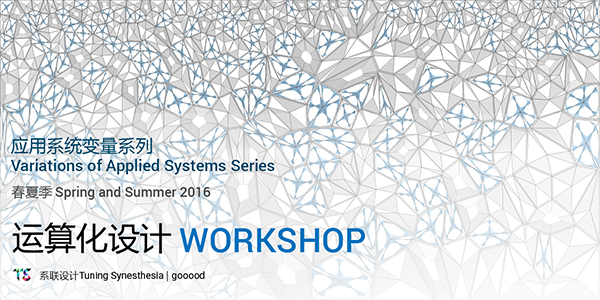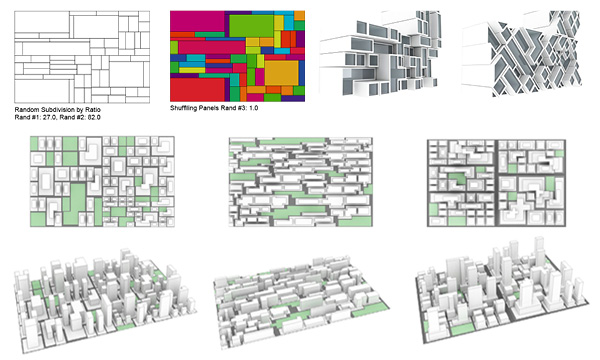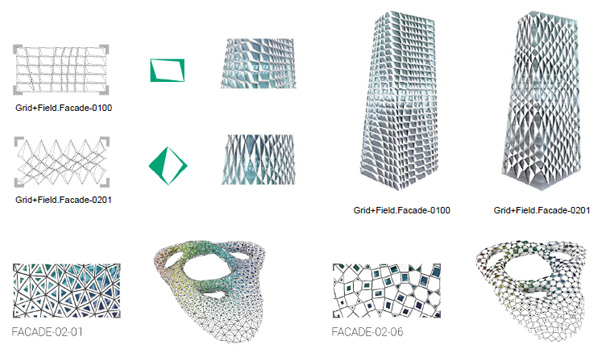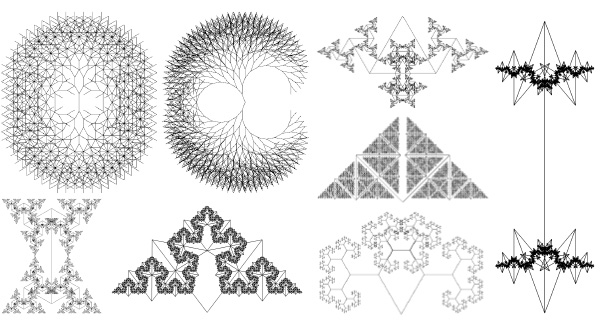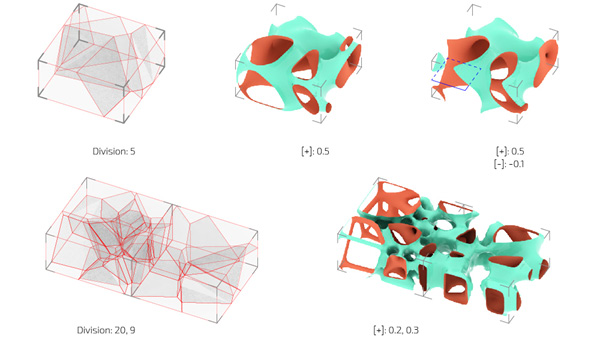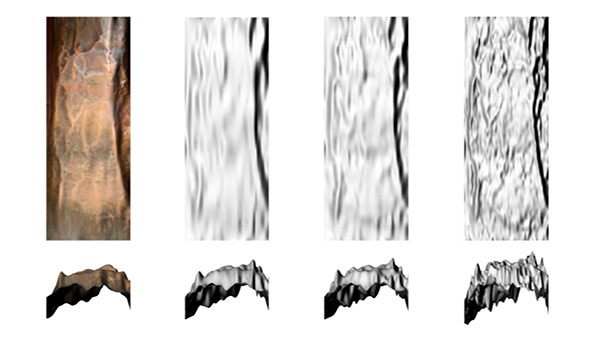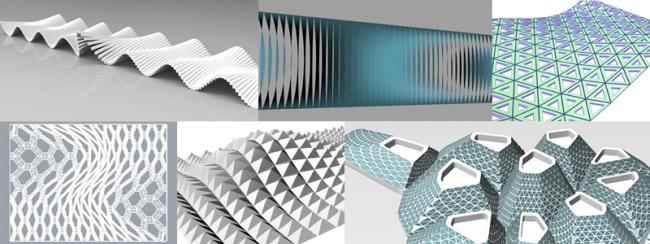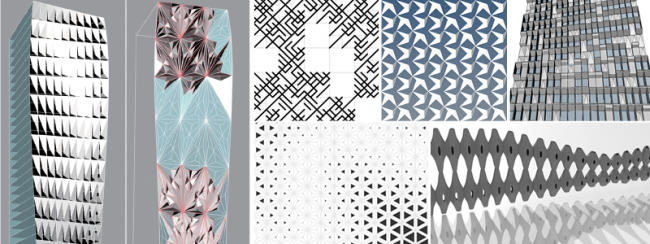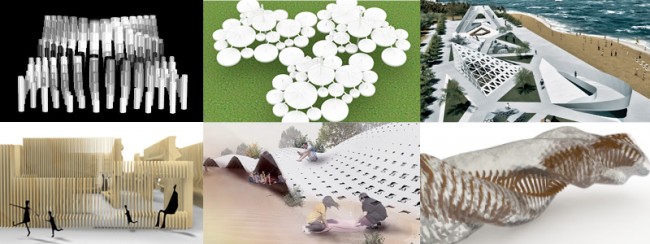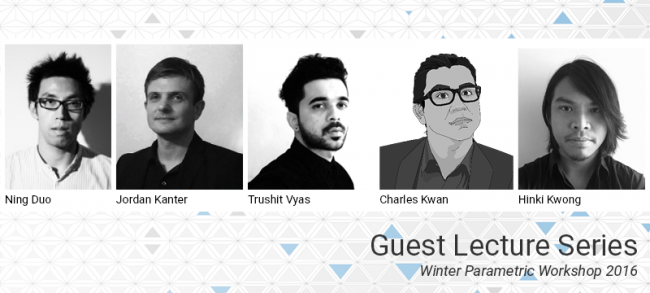春季周末班
课题:设计原型与高级算法建模
内容:Rhino高级 Advanced; Grasshopper及其插件Plugin; GH Python脚本编写Coding; 应用系统与原型System & Prototype
地点:三里屯SOHO/景山西街44号
语言:中文和英文
时间:5月28日-7月17日的周末,9个全天8小时课程+3个半天讲座。想参数化班的初级学员,周日半天为你们提供零基础的辅导。
费用:5880元
夏季系列
课题:建造训练营与运算化设计 Computational Design + Fabrication Workshop
内容:建模班(Rhino;GH)+ 设计班(应用系统与原型System & Prototype; Fabrication)
语言:中文和英文
时间:7月25日-8月31日的工作日
预报名保留席位:http://form.mikecrm.com/aBFpeZ
初夏课程是系统研究,分析其运算逻辑,开发设计原型(无外界影响因素的原型)。设计方法不受软件本身约束,通过自己的逻辑改变算法,控制变量来形成多种不同的设计。夏季课程同样关注这种基于系统的设计方法,及这种方法下的更具体的设计流程,并增加数字化制造的内容。
应用系统变量系列
Variations of Applied Systems Series
语言 Language:中文和英文 Chinese and English
运算化设计研究营 | 系联+谷德 Computational Design Workshop | Tuning Synesthesia + Gooood
初夏设计原型与高级算法建模
Spring 2016 Design Prototyping with Advanced Algorithmic Modeling
简介 Description
本课程——“设计原型与(高级)算法建模”, 是当今世界领先且高效的运算化设计方法。课程基于Rhino和Grasshopper(GH)运用,学生可以根据自己水平来选择课程。课程重点帮助学生了解并掌握系联设计团队的系统研究与设计原型,而在此之前则将全面介绍运算化设计的工具和技巧,其中包括:复杂Rhino,GH建模,及各自插件和内嵌于GH的Python编程语言(周末班)。通过实际建模练习,帮助学生形成运算化设计的思维方式。课程将邀请多位嘉宾讲师,帮助加速学习进度的同时整体拓宽学员对当代设计及其背后科技与设计方法的理解。
This course Design Prototyping with (Advanced) Algorithmic Modeling is the second installment in the Variations of Applied Systems (VAS) series. It is designated as an efficient entry to the core of recent computational architecture and design methodologies with use of Rhinoceros (Rhino) and its plugin Grasshopper (GH). There are a two courses available in this Spring Workshop according to the level of student. At both levels, the emphasis is on a series of collaborative research in system and design prototyping, but prior to introducing said research, essential tools and skills will be thoroughly introduced to the students. These skills include: modeling on Rhino, its plugin Grasshopper (GH), GH plugins, and python coding within GH (for Weekend Course). This course also features a series of guest speakers who will help accelerate the students’ learning process, while increasing their depth of knowledge in contemporary design and technologies, as well as their derived methodologies.
Lab由四个阶段组成:
Rhino高级建模; Grasshopper及其插件的高级建模; GH Python脚本编写; 应用系统与原型。
The lab will consist of four phases, each based on the following subjects: Advanced Rhinoceros; Advanced GH and its plugins; GH Python Scripting; System and Prototype.
| 阶段1 Rhino: 高级 Advanced
课程将从软件培训开始,侧重学习Rhino 5 的基础和核心命令,此外,辅以世界著名建筑项目案例,学员将全面掌握从基础到高级的建模过程。
注:“软件主导形体至上”的设计方法是一直以来颇具争论的话题,我们希望通过这次集中培训加深学员对参数化的理解,在今后的设计中能够将这套设计方法有效地应用在不同层面。
This phase of the workshop begins with a software tutorial on Rhinoceros 5 (Rhino), which will focus on all basic and essential commands. Students will then be guided through each stage of the software’s 3D modeling process to regenerate samples of world-renowned architectural projects. Note: Although there has been much debate regarding the excessive reliance on software-driven form-oriented design, for the purpose of this short intensive training session, it will provide students with a broader understanding of how to apply the tools effectively in various formats.
课程中将会涉及犀牛插件T-spline。
A Rhino plugin (T-Spline) will be incorporated into the modeling process.
| 阶段2 GH: 高级 Advanced
第二阶段将进入Grasshpper培训,其中包括著名的建筑案例建模。教学主要包括GH自带组件三角面(泰森多边形、Metaball)和场,以及相关GH插件比如Lunchbox, Paneling Tool, Weaverbird, Kangaroo, Geco, FlowL。与传统设计不同,参数化设计的本质基于算法;通过GH可以实现从算法到设计的过程。掌握GH的基本工具和工作流程后探索软件的核心概念,充分理解生成机制。
This phase will guide students through the parametric modeling process by having them regenerate samples of world-renowned architectural projects. An emphasis is placed on relatively new GH components categories, such as Triangulation (Voronoi Metaball) and Field, as well as a comprehensive introduction of several GH plugins, such as Lunchbox, Paneling Tool, Weaverbird, Kangaroo, Geco, FlowL, etc. Unlike traditional design, parametric design is, by nature, based on algorithmic processes. This approach to design is made possible by GH. We will include Phase 2 with a review of the software’s essential concepts in order to help students fully grasp its mechanisms.
| 阶段3 Coding: GH中的Python 脚本 Python in Grasshopper
周末班
本阶段包含Python句法与面向对象编程(OOP)概念和它们的实际演练。过程中将指导学生编写自己的GH python 组件。
This phase begins with a basic tutorial on essential Python syntax, as well as the concept of object oriented programming (OOP) and its use in practice. Students will then be guided through each stage of developing their own GH python component.
| 阶段 4设计原型与系统变量 Phase 4 Design Prototype
第四阶段的重点是系统的研究设计营与设计原型的开放讨论。此研究平台的目的在于增强学生对于当今设计与科技的深度理解,使学生能够在小组合作项目中探索并应用新技能。同时整合部分系统到独立的设计中去,并体会这些参数如何引发设计结果的改变(功能和美学层面)。小组合作的研究包含如下系统。(更详细的内容请参见后面的研究议程)
The highlights of Phase 4 are a research lab of the system and prototyping with an open-forum for discussion. The goal of this research platform is to increase the depth of students’ knowledge in contemporary design and technologies, whereas it largely allows students to explore and apply their new skills through assigned group projects. By making a combination of some systems into the simplest form of design, a prototype, students and lecturers all together explore how parameters can vary the result from the view of both functional and aesthetic properties. The target systems to be researched are Stochastic, Field, Fractal, Voronoi, and Wrinkle. (See below for the research agenda)
研究议程 Research Agenda
系统的定义是“组件构成的整体”,它存在于从自然到文化再到人类社会的不同领域和组织中。
我们的系统研究通过总结这些系统原型, 提取它们的内在属性作为元组件,以实现通过改变参数控制设计结果(系统控制)的目标。从系统中提取的规则与形式,将被抽象转化为不针对场地、可以在实践中反复利用的设计原型 。设计原型作为抽象的系统应用形式,通过具体项目中系统参数的改变又可以进一步转变为设计目标质量的自定义控制量。这些总结出的原型可以应用于任何相关的实践项目中。
设计是发现问题并解决问题的过程,而策略的选择会影响最终的设计结果,运算化可以提升这一过程。我们希望本次研究营能够帮助每一位在面对设计矛盾时致力于寻找多重解决方案的设计师,了解如何通过前沿科技与设计思想来实现这一过程。
A system may be defined as a set of components that shape a whole and can be found in various fields of matter and organization ranging from nature to culture and society, among others.
Our system research begins by studying certain system examples and extracting their properties as seeds of ruled components, aiming to achieve their respective design goals in practice through variational design. The rules and patterns extracted from these systems will be used in prototypes, which will be reusable across practices due to the intentional omission of localization and are, thus, designated to be the most abstract form of system application, whereas the system parameter will be utilized and transformed into the customized control of our targeted design quality. The prototypes can be applied to any applicable and practical project.
The design process is rooted in finding solutions to problems, whereby the strategy implemented defines the resulting design. This is also what computation can help to improve. It’s our wish that our lab can be of assistance to anyone who is seeking alternative strategies for solving various problems in design, and how to begin shaping that process through new technologies and new ideas.
时间与费用 Schedule and Fees
| 周末班 Weekend Course
时间 Time:5月28日-7月17日的周末,9个全天8小时课程+3个半天讲座。想参数化班的初级学员,周日半天为你们提供辅导。费用Fee 5880元
* Lab的时间表有可能根据特邀嘉宾的时间进行适当调整
The lab schedule may be subject to change according to guest lecturer’s availability.
研究团队 Research team
| 研究导师 Research Director
冬木千枝 Chie Fuyuki
系联设计(Tuning Synesthesia)创始人、东京立教大学文学学士、普瑞特艺术学院建筑学硕士、曾就职于纽约Lindy Roy事务所、MAD事务所
Founder and Principal Designer, Tuning Synesthesia; M.Arch. Pratt Institute, B.F.A Rikkyo University; Previous Work Experiences: Roy Co., MAD Ltd., THAD.
冬木千枝是专业的“设计工程师”,也是系联设计的主要创始人。系联设计是一支由多元背景的设计师与工程师组成的国际合作团队,为多个设计领域如总体城市规划,建筑设计,建筑表皮标准化,景观设计以及网络开发等提供服务。作为运算化设计的专业顾问,团队曾与多个事务所合作项目,且某些作品获得奖项。
千枝的专业技术延伸到科技和创新设计,涉及建筑学、计算机科学、文学、艺术和音乐等多种领域——对运算化的应用是它们的共同点。正是由于专注于独特的跨学科设计促成了系联设计的创立。作为首席设计师,千枝带领她的团队对已有的系统和设计原型在建筑和网络开发的应用进行专项研究;正因如此,千枝在近几年内成功举办了多次讲座和研究营,与此同时,学术和实践的各类项目也在她的领导下成果斐然。
Chie Fuyuki is a professional designeer and the main founder of Tuning Synesthesia (TS/tSynsth)—an international collective of young designers and engineers. The team provides services in master planning, architectural design, building skin standardization, landscape design, and web application and design. As specialized consultants in computational design, the team has collaborated on projects with many global and domestic firms, some of which have been awarded notable recognition.
Chie’s expertise extends to several areas in technology and creative design, including: architecture, computer science, literature, art, and music—all linked with the use of computation as a common denominator. It is this special focus that inspired the founding of Tuning Synesthesia. Now, as principal designer, she directs her team in specialized research of current existing systems and design prototypes for application in architecture and web development; as a result, several lectures and workshops have been successfully organized in recent years, and projects, both practical and academic, have blossomed under her leadership.
| 研究成员 Research Member
覃立超 Lichao Qin
系联建筑设计师、广西大学建筑学学士、曾就职于MAD、度态建筑、清华建筑设计研究院及悉地国际
Architect, Tuning Synesthesia; B.Arch Guangxi University; Previous Work Experiences: CCDI, THAD, MAD, DotA
张梦瑶 Mengyao Zhang
系联设计研究人员、米兰理工大学硕士、清华大学建筑学学士、Thinkwell 视觉与内容设计师、曾就职于北京市建筑设计研究院(BIAD)
Researcher, Tuning Synesthesia; Visual and Content Designer, Thinkwell Asia; M.Arch Politecnico di Milano; B.Arch Tsinghua University
Julio Lemena
系联设计网络开发设计师、北京交通大学软件工程学生
Design Engineer and Web Developer, Tuning Synesthesia; BJTU Software Engineering
| 助理 Assistants
胡天宝 Tianbao Hu
系联设计公关媒体与设计实习生、北京林业大学园林学士
Designer and Communications Intern, Tuning Synesthesia; BJFU B.AG Landscape Architecture
Billy Brodus, Helen Au
特邀嘉宾 Guest Lecturers
朵宁 Ning Duo
度态建筑主持建筑师、英国AA建筑联盟建筑学硕士、清华大学建筑学学士
Principal Designer, dot Architects; M.Arch AA; B.Arch Tsinghua University
马丁 · 米勒 Martin Miller (美国)
非静止建筑设计总监、美国康奈尔大学建筑学院课题研究首席研究员兼客座教授、美国宾夕法尼亚大学建筑硕士
AntiStatics Architecture Design Director, Primary Investigator and Visiting Critics, Cornell University Architecture Department, M.Arch Upenn
郑默 Mo Zheng
非静止建筑设计合伙人、美国渐近线建筑中国首席代表、美国宾夕法尼亚大学建筑硕士
AntiStatics Principal and Design Parnter, Asymptote Architecture, China Chief Representative, M.Arch Upenn
于魁 Kui Yu
自修建筑设计、 2004-2015工作于MAD
Architecture self-studied; Previous Work Experiences: MAD (2004-2015)
其它 Requirements
自备笔记本电脑 ,需要使用Windows系统 (Mac系统与GH存在兼容性问题)。请预先下载Rhino及GH。
It is required for students to bring their Windows laptop to participate this lab. (GH for Mac exists however it is still a very early version). Download Rhino and GH before the lab starts.
学生作品展示 Students Achievement
优秀学生作品将会在谷德和系联设计网站上展示。
The best students’ final work will be published both in gooood and Tuning Synesthesia website.
报名方式 How to Apply
1. 点击到此页面进行报名
2. 或者你也可以写下自己的姓名、年龄、职业、公司或学校、电话、邮箱,发邮件至 edu@gooood.hk 进行报名,我们会尽快回复你的邮件,报名以完成付款为准。
合作团队Organization
系联设计团队Tuning Synesthesia 谷德gooood
系统研究案例 Examples of Research
更多系统应用请看网站 See at:http://tuningsynesthesia.com/en/system
| 随机 Stochastic
| 场系统 Field
| 分支系统 Branch
| 泰森多边形 Voronoi
| 褶皱 Wrinkle
往届学生作业与作品回顾
系联设计与匠人营国合作的参数化设计工作营学生的作业与作品。
Students work from the last winter parametric design workshop by Tuning Synesthesia & 匠人营国.
Phase1 Rhino http://tuningsynesthesia.com/en/blog/phase-1-parametric-design-workshop/
Phase2 GH http://tuningsynesthesia.com/en/blog/phase-2-parametric-design-workshop/
Phase3-1 System http://tuningsynesthesia.com/en/blog/phase-3-parametric-design-workshop/
Phase3-2 Design Studio http://tuningsynesthesia.com/en/blog/phase-3-parametric-design-workshop-design/
往届邀请嘉宾Guest Lecture http://tuningsynesthesia.com/en/blog/ww16_review-guest-lecture/
课程概览
初夏周末班
课题:设计原型与高级算法建模
内容:Rhino高级 Advanced; Grasshopper及其插件Plugin; GH Python脚本编写Coding; 应用系统与原型System & Prototype
地点:三里屯SOHO/景山公园内
语言:中文和英文
时间:5月28日-7月17日的周末,9个全天8小时课程+3个半天讲座。
夏季系列
课题:建造训练营与运算化设计 Computational Design + Fabrication Workshop
内容:建模班(Rhino;GH)+ 设计班(应用系统与原型System & Prototype; Fabrication)
语言:中文和英文
时间:7月25日-8月31日的工作日
预报名保留席位:http://form.mikecrm.com/aBFpeZ
初夏课程是系统研究,分析其运算逻辑,开发设计原型(无外界影响因素的原型)。设计方法不受软件本身约束,通过自己的逻辑改变算法,控制变量来形成多种不同的设计。夏季课程同样关注这种基于系统的设计方法,及这种方法下的更具体的设计流程,并增加数字化制造的内容。
课程福利
优秀学生作品将会在谷德和系联设计网站上展示。
联系方式
电话:010-5618 0075 (周一至周五:上午9点半-下午5点半)
邮件:edu@gooood.hk ,请留下姓名,电话,
联系人:高老师
网址:http://www.gooood.cn/edu-tuning-synesthesia-research-workshop
微信群:
